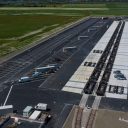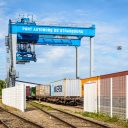FM Logistic starts with rail-road combi freight services

One of France's biggest independent logistics services providers, FM Logistic, is poised to make a concerted move into the rail-road transport segment. Initially operating on a north-south corridor and with the company handling first and last-mile operations, the proposed combi service will have a designated rail traction partner and will use FM Logistic-branded containers. Speaking to French media, FM Logistic's director of customer experience, sustainable development, business solutions and technology, Yannick Buisson, said: "We are currently sensing growing demand for this kind of service and have no doubt that this rail freight offer will attract customers.
We have already identified current road-borne freight flows that could be handled by multimodal transport in the future." Although combined transport currently accounts for no more than 5 per cent of its logistics solutions, FM Logistic's ambition is to increase this to 15 per cent - 20 per cent in the near future.
Starting in 2025
Buisson's comments were confirmed by an FM Logistic spokesperson. The spokesperson added that no further details about the combi service were available at this stage.
Confident in its development potential, the family-owned enterprise plans to roll out the combi service across Europe in 2025. "It will complement our portfolio of services, which has already been enhanced in recent years with last-mile delivery," Buisson commented. Boosted by the growth of e-commerce, this activity has been developed in Spain, particularly with customers such as Inditex, Ikea, and Amazon, he added.

Benefiting from subsidies
In the company's blog FM Logistic's director, international transport, Damien Perdereau, underlined that multi-modal transport has been in the company's agenda for some time already. "It is more profitable to use road transport if the distance is less than 500 kilometres," he explained. "Beyond that, rail transport makes economic and environmental sense.
From an environmental point of view, it is crucial to switch to low-carbon modes of transport, but we need to find the right economic balance." However, he noted that embracing the shift was not without challenges, as adequate rail infrastructure dedicated to goods flows was an issue in France. Nevertheless, a recent surge in political determination to revamp the country's infrastructure, bolstered by the backing of European subsidies, provides a more positive outlook.
Perdereau also explained that FM Logistic was working on equipping its logistics hubs in France and Europe with railheads to offer rail freight solutions. "This will require major investment, but we should benefit from local, national and European subsidies."

You just read one of our premium articles free of charge
Want full access?
Take advantage of our exclusive offer
References
- ^ See the offer (www.railfreight.com)